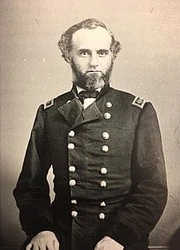
Richard W. Johnson
Richard W. Johnson (1827–1897) was an officer in the Union Army during the American Civil War.
Personal life[]
Richard Woodhouse Johnson[1] was born in Kentucky on February 27, 1827, in Smithland, Livingston County, Kentucky to James Johnson (1785–1837) and Louisa Harmon Johnson (1790–1837).[2] Johnson married Rachael Elizabeth Steele (1826–April 7, 1891). Their sons were Captain Alfred Bainbridge Johnson (March 31, 1853 – March 18, 1897) and Major Richard Woodhouse Johnson (January 15, 1855 – July 24, 1929).
Early career[]
Johnson graduated from the United States Military Academy in 1849 and up to the time of the American Civil War was employed chiefly on frontier service. In 1861 he was commissioned colonel in the 3rd Regiment Kentucky Volunteer Cavalry and soon afterward became a Brigadier General, United States Volunteers. He took part as a cavalry commander in the western campaigns of 1861 and 1862 and on August 21, 1862, was defeated and captured by Colonel John Hunt Morgan, whom he had been sent to drive out of Tennessee.[3]
In the Army of the Cumberland[]
In the Battle of Stones River Johnson commanded a division on the right flank under Major General Alexander McCook. Johnson's command was flanked from its position by the initial Confederate attack. At the Chickamauga, his division of the XIV Corps formed part of the command of General Thomas. During the battle of Chattanooga, it was one of the divisions that charged up Missionary Ridge. The next year he commanded a division in the Army of the Cumberland during the invasion of Georgia and was severely wounded at the battle of New Hope Church (May 28, 1864).
Cavalry service[]
On August 22, 1864, Johnson was made chief of cavalry of the Military Division of the Mississippi. He commanded a cavalry division at the battle of Nashville. On the second day of the battle, Johnson was given the brevet rank of major general of volunteers, supplemented on March 13, 1865, by the brevet rank of brigadier general in the regular army, and on the same day was brevetted major general in the regular army for "gallant and meritorious services during the war." Johnson was left behind when Maj. Gen. James H. Wilson began his raid into Alabama in 1865.
Post war[]
Johnson was mustered out of the volunteer service on January 15, 1866, and became provost marshal general of the Military Division of the Tennessee, and later acting judge advocate in various military departments. He resigned in 1867 with the rank of major, which grade by an Act of Congress (March 3, 1875) was changed to that of brigadier general. He published A Soldier's Reminiscences in Peace and War (1866) and a Memoir of Major General George H. Thomas (1881). Johnson died on April 21, 1897, in Saint Paul, Ramsey County, Minnesota, and is buried there in Oakland Cemetery.[4]
See also[]
References[]
This article incorporates text from a publication now in the public domain: Gilman, D. C.; Thurston, H. T.; Moore, F., eds (1905). "article name needed". New International Encyclopedia (1st ed.). New York: Dodd, Mead.
- Cozzens, Peter, No Better Place to Die: The Battle of Stones River, University of Illinois Press, 1990, ISBN 0-252-01652-1.
- Cozzens, Peter, The Shipwreck of Their Hopes: The Battles for Chattanooga, Chicago: University of Illinois Press, 1994, ISBN 0-252-01922-9.
- Cozzens, Peter, This Terrible Sound: The Battle of Chickamauga, University of Illinois Press, 1992, ISBN 0-252-02236-X.
External links[]
- "Richard W. Johnson". Find a Grave. http://www.findagrave.com/memorial/5892342. Retrieved 2009-05-03.
The original article can be found at Richard W. Johnson and the edit history here.